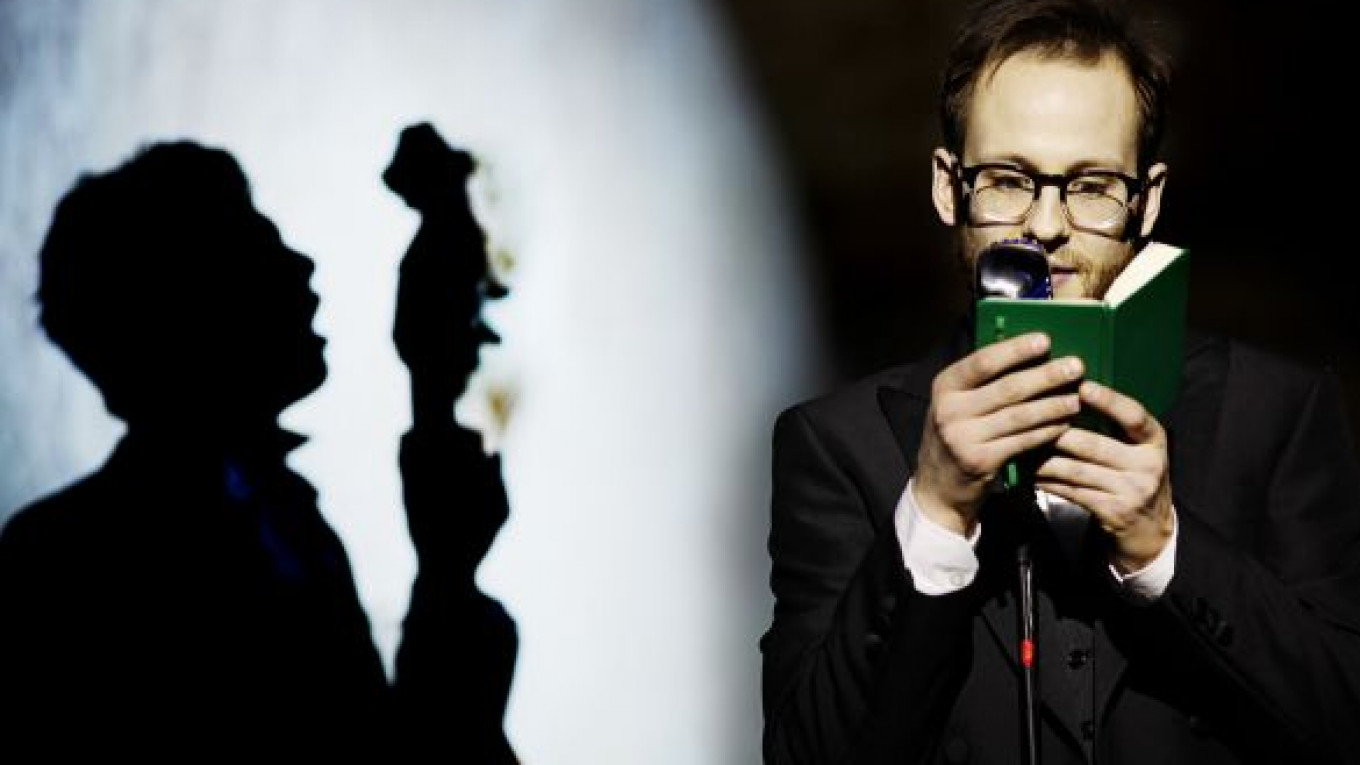Kirill Serebrennikov's production of "Dead Souls" at Gogol Center starts with a prolonged slap in the face of Russian mores. From there it cranks up the vitriolic satire for nearly three hours without a break.
Is that too much for you? Two hours and 50 minutes? Imagine what one or two millennia of being Russian must mean.
Now before someone raises an eyebrow about me, a foreigner, making cracks like that, let me remind you what we are talking about. Nikolai Gogol. "Dead Souls." Written 170 years ago. People far more learned than I have called this one of Russia's greatest novels. We're talking about what Gogol wrote, not what I think. Gogol is the one who plaintively asked, "Russia, where are you racing to?" I'm just here to quote him.
Serebrennikov, one of Russia's most interesting directors, took what Gogol wrote, peered into its depths and found in it a horde of timeless characters — shysters, thieves, thugs, skinflints, eccentrics, boors and maniacs. Dress them in modern dress and — bingo! — they look almost familiar, don't they?
That prologue I mentioned hints at much that follows in the course of the story. A wheel is coming off a carriage and people gather to discuss whether it will last to its destination or not. One man says, "yes." Another says, "no." The conversation repeats over and over, never accomplishing anything and never resolving the potential problem at hand.
"Dead Souls" follows the misadventures of the soft-spoken Pavel Chichikov (Semyon Shteinberg) as he travels in the Russian backwater. His purpose is to amass a fortune on paper by cheaply buying up the records of serfs who have died since the last census. If he can collect at least 300 of these so-called "dead souls" he will look like a rich man to anyone that doesn't ask too many questions.
This goal brings him into a nameless provincial town where he makes the rounds of the local landowners. Each, thanks to Gogol's genius for words and images, and to some all-around brilliant acting at the Gogol Center, is a small satirical masterpiece. There is the fastidious and slightly manic Manilov (Odin Biron), the cautious Madame Korobochka (Oleg Gushchin), the frantically unhinged Nozdryov (Mikhail Troinik), the brutishly unscrupulous Sobakevich (Anton Vasilyev) and the demented Plyushchin (Alexei Devotchenko).
Serebrennikov, who also wrote the adaptation and designed the set and costumes, essentially turned everything over to his actors. They work on a simple plywood stage with just a few props — tables, chairs and coffin-like boxes to aid them. The most important object on stage is a microphone down front that is always ready for actors to step up and sing a song composed by Alexander Manotskov based on Gogol's texts.
The sometimes plaintive, sometimes quirky songs provide additional emotional shading in this otherwise blunt force — and very funny — lampoon.
All roles, including women, children and dogs, are played by grown men. The bearded, long-legged Ilya Kovrizhnykh plays a grotesquely demure Madame Manilova. The towering Yevgeny Sangadzhiyev plays Sobakevich's inscrutable and menacing wife Feodulia. As a potential bride for Chichikov, the bald, muscular Nikita Kukushkin might just be someone's ideal erotic nightmare.
I would be remiss if I failed to mention Kukushkin and Vasilyev's gut-splitting performances of Manilov's two hilariously psychotic children.
Gogol in his novel created a kind of museum exhibit of extreme Russian characters. Serebrennikov's production strips away most of the literature and leaves behind a concentrated stew of rich character and bizarre situation.
Shteinberg's Chichikov is the most sane among this pack of crazies. Sure he's up to something weird, but it's not illegal and he bears no one malice. It's only a matter of time, however, before he cracks under the pressure piled on him by the cranks he encounters.
Serebrennikov's "Dead Souls" is yet another major success from this theater that is just one year old this month. It strikes me as coming close to the ideal modern adaptation of a classic.
And if three hours with no intermission seems excessive, just remember: Russia is no place for the timorous. "Dead Souls" is about that, too.
"Dead Souls" (Myortviye Dushi) plays March 1, 27, 28 and 29 at 8 p.m. at Gogol Center, located at 8 Ulitsa Kazakova. Metro Kurskaya. Tel. 499-262-9214. gogolcenter.com. Running time: 2 hours 50 minutes.
Contact the author at [email protected]
A Message from The Moscow Times:
Dear readers,
We are facing unprecedented challenges. Russia's Prosecutor General's Office has designated The Moscow Times as an "undesirable" organization, criminalizing our work and putting our staff at risk of prosecution. This follows our earlier unjust labeling as a "foreign agent."
These actions are direct attempts to silence independent journalism in Russia. The authorities claim our work "discredits the decisions of the Russian leadership." We see things differently: we strive to provide accurate, unbiased reporting on Russia.
We, the journalists of The Moscow Times, refuse to be silenced. But to continue our work, we need your help.
Your support, no matter how small, makes a world of difference. If you can, please support us monthly starting from just $2. It's quick to set up, and every contribution makes a significant impact.
By supporting The Moscow Times, you're defending open, independent journalism in the face of repression. Thank you for standing with us.
Remind me later.







